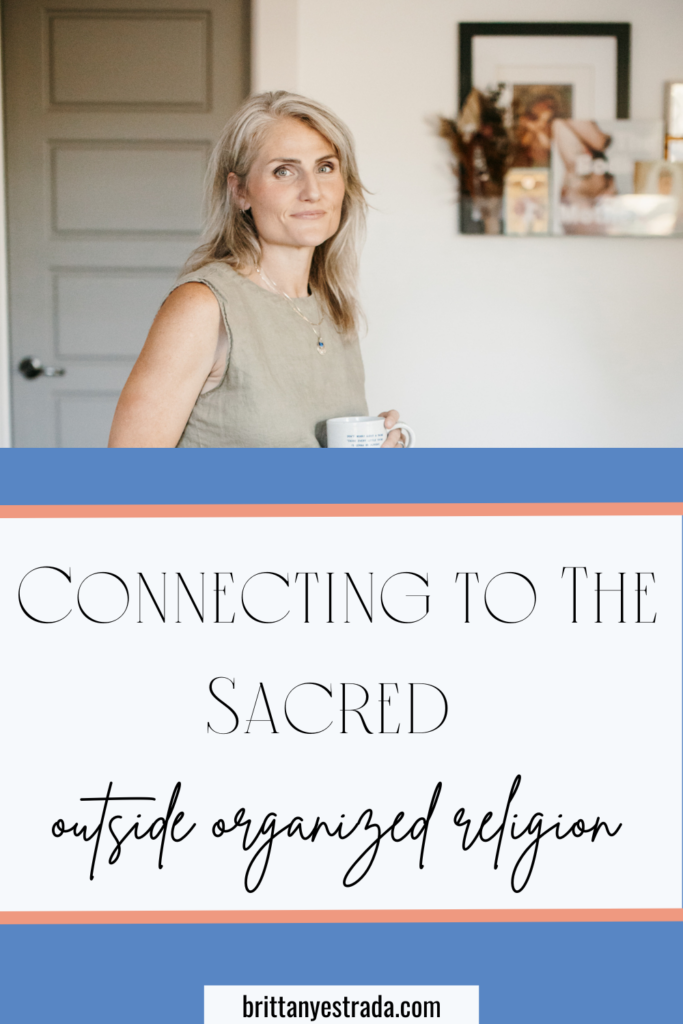
Hey Love!
Connecting to the sacred feminine outside of organized religion can take some practice. That’s why we wanted to interview Leah Deveau to bring light to this topic.
We will discuss:
- what stepping outside organized religion looks like
- how science is not final and more of a conversation
- how and why to have a sacred practice in your life
You can catch the full episode on Patreon!

Erica: Hello everyone, I’m super excited to introduce you to today’s guest. Leah DeVoe is a sacred science teacher, a registered nurse, a historian and academic, a healer, and a mother to two young children. She delights in dancing in the space between science and woo-woo as she says.
And from an early age, Leah recognized how sacred texts have been used as weapons of the patriarchy for millennia. She is committed to translating stories and metaphors and messages in order to de-weaponize them and restore the frequency of love embedded into the core of their teachings. Leah is also the owner and operator of the Canadian Home Health Innovation Agency, Fiddleheads and Ferns, which is rooted in the Newman nursing theory of health as expanding consciousness and the social determinants of health. She and her team provide services in health coaching with respect and reverence of spiritual practice. Health team education supports these practices within systemic care, and they also offer private medical translation and medical systems navigation.
Leah: Well, thank you very much for having me. I am a sacred science teacher is how I kind of
have recently defined my offering to the world. I love to take it all in and then translate it into ways for people to understand sacred concepts and scientific concepts more easily. We have a lot of confusion, whether intentionally or unintentionally created in our environments. And that can make it difficult for us to discern the truth. What is truth? And so that’s the place where I like to play is in curiosity and in creativity and just having the conversation. I think one thing we’ve forgotten is that science isn’t about facts, it’s about conversation. And so one scientist speaks to another scientist through these papers, and then those scientists speak back to the other ones to say, well, we tried that, and this is what we found. And when it gets reported in different ways with people out of context, we lose that dialogue, and we lose that curiosity that is inherent in the practice. So I love to bring that sense of curiosity into my practice as a registered nurse and my practice as a healer and as a mother and as a biblical scholar. There’s a lot. I mean, how do you define yourself? It’s a question for someone with ADHD gets a pretty big, pretty fast.
Brittany:I love what you said about science being a conversation because unfortunately what we have so often been told particularly over the last three years is, hey, the science is settled, we settled that. And as someone who loves science myself, I always just die a little inside when I hear those words because the science has never settled. That’s the whole point to always be curious and always be learning and always be open to, you know, changing your conclusions based on what you’re learning, right? And oh, I just I, I so love that you said that it’s a conversation and it’s an evolving conversation.
Breaking Down What We’ve Always Been Told
Leah:Yeah, it really is, you know. So, you know, one of the curious tangents that I have gone on in recent years is to read medical textbooks from the 1800s. So what’s really cool about doing this
is we learn two things. We learn how much has not changed and how much has changed. And that to me is one of the most fascinating things because we, unless we purposefully and consciously explore concepts, engaging it with curiosity, we kind of accept a lot that’s just been given to us as fact. Like, oh, well, they said it was a fact and they are educated professionals, so I’ll take their word for it. And the science is settled. Well, you know, and that’s never really true because…it’s just a dialogue. You know, one of my studies that I look at is how the Bible specifically has been used as a weapon against women and against all people. My favorite verse in the entire book is John 7-16, to summarize what Jesus said, if you do the will of God, you will understand whether my teaching is true or not. And that essentially is science, right? If you try the thing, if you experiment, if you see for yourself, you will understand, you will hold that within yourself, and you’ll get it. And so that is, that is the I think defining piece of my curiosity, right, summed up into that is let’s experiment. Let’s try this. Let’s try that. Let’s not think we have all the answers. Let’s be open in conversation and let’s have fun.
Erica: Oh my gosh. Yes. And we’re such a society of we want the answer before we try the thing. We were so focused on science and evidence that we want there to be an answer before the exploration or before the curiosity and it feels like we have to flip that again on its head even though if you stop and think that it flipping it on its head is what makes sense like common sense but we’ve gotten lost in that.
Leah: So you know what’s happened is exactly what you’ve described Erica which is we have
gone from this hypothesis model. So this is what I think will happen. So that’s what’s going to happen. And in essence, on a quantum level, that is kind of true. And also, it doesn’t leave room for expecting the unexpected. And how can we be surprised and delighted? And this is where I think sacred practice has a lot to teach us about scientific practice. Because our sacred practices introduce us to this concept of expecting the unexpected and finding delight and joy in the little things so that they come more naturally in the big context.
Brittany: Oh my gosh, Leah. My mind is like going in a million places because I already love this conversation so much. Can you tell us a little bit about your religious upbringing, like what that looks like for you for most of your life, and then how you have kind of, I mean, stepped outside what many of us have typically been taught in organized religion? What does the sacred feminine look like for you?
Leah: Sure. So I grew up in a Catholic home, attending church every Sunday. And I didn’t go to Sunday school. That was not something my parents did, but they were part of a St. Ignatian group, a community, which Ignatian spirituality is very self-reflective. And so I was introduced to concepts of self-reflection very early. And with that, I also recognized how…oh, what’s the word? It’s escaped me. I saw a discrepancy between what was being said within the church and what was what the actions were as a result of that. Like any kind of precocious, curious child who kind of asked the questions, you know, I really held to this sense of like, what is going on with these grown-ups? That, you know, they’re saying this, but then that’s not what’s happening. And I notice even now with my own children, how much they are like that and I celebrate that in them. And it drives me crazy. Because, you know, they’re asking questions about what they’re seeing in me, right? So they’re seeing when I’m out of congruency, then they’re pointing that out to me. And it’s like, Oh, there you are. So this is what I was like also, and I saw that early on. And so it’s a point of pain, and I think that so many of us have, where we read the text and the text holds this energetic frequency of love, like truly at its very core. If we read it independently of others and just read it for what it is, I believe that imprints onto us. And also, it is just laced with such…such harm, like so much harm has been caused, whether intentionally or unintentionally, or very tensionally, you know, in all areas. And, you know, it makes sense. I mean, we’re human. And the church, you know, my experience is the church taught me very clear Binaries. So it is right and it is wrong. And you can only be this, you cannot be that. And the problem with that lens is that we are human and we are all of those things at the same time. We are right about this, we’re wrong about that. We have no clue, we don’t know, we’re just learning, we’re growing. It’s like me saying to my son, like, what do you mean you’re not gonna write this academic paper? like what’s wrong with you? It’s like, well, he doesn’t have the skills, he doesn’t have the practice, he doesn’t have the experience, he doesn’t have the mentorship to grow in that way. And all of us need that. And so, you know, I hesitate to come out and speak sometimes of what I have learned in my own practice simply because the more we learn, the more we realize we don’t know. This sense of, you know, just wanting to share from this place of growth, instead of this place of, you know, having the answers. Yeah, and, and, and just speaking against like what what my experience has been. You know, it’s saying that there’s, there are beautiful, loving people everywhere. Also I think we need to take a really clear, hard look at where we personally live in congruently. We are out of alignment because that is what we have control over. If I’m always projecting to you what you’re not doing, then I’m removing the attention from what I truly have control over. What we will experience and are experiencing, I think Brittany, you commented this on your first episode about how like there’s a tipping point where in five years, we’re gonna see massive, massive shifts in all systems in our society. That is coming from this place of like, we are now getting individually congruent with what our core values and true nature, sacred space is, we’re taking up that space. And now we are aligning with others in a way that is collaborative instead of confrontational. And it’s very, it’s a painful experience to navigate because we feel the pain of other people in that struggle of the right or the wrong and we need to step out of that or step back from that and really just surround the whole group with like, where I think it was a colleague of Brene Brown’s and her name is just escaped me sadly. But she defined it as competing commitments. So we have commitments and we share similar commitments. We want our kids to grow up safely. We want our families to thrive. And we want success for ourselves and for our neighbors. I think that’s something we can all agree on. Competition comes in and how that gets done. And we really need to step back away from that and slowly walk with each other. In that way, we can only do that if we’re in line ourselves. And so that comes down to our own practice.
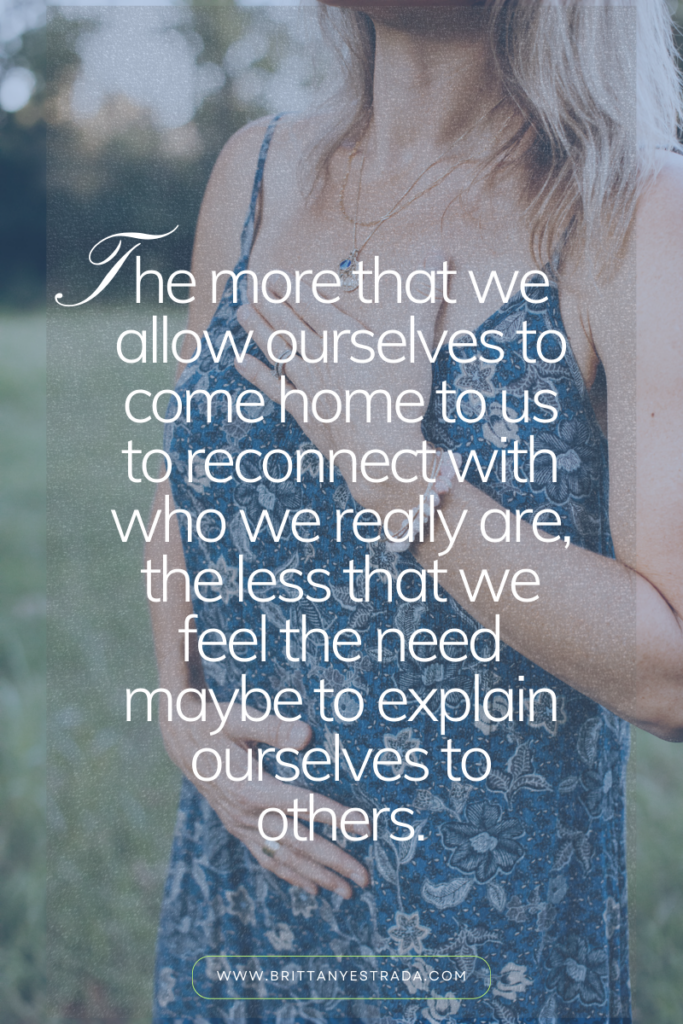
Looking Inward To Ourselves For Sacred Feminine
Brittany: Yes, starting with ourselves, I think it’s really easy to look outside ourselves for answers because that’s how we’ve been conditioned our whole lives, especially if you grew up in organized religion, because you look to God, you look to your pastor, your preacher, the head of your church for guidance for everything. We are also conditioned this way in our medical system. You look to your doctor to tell you what’s going on with your body and how to medicate so that your symptoms are taken care of.
And so this idea of coming back into your body is really revolutionary, but it’s really the way forward. Right. I mean, just solidifying that practice within yourself is is really where we have to start. And that is a complete paradigm shift for where we have been for probably the last few thousand years.
Leah: Yeah. So, you know, what we’ve forgotten, I think, I don’t know if we’ve forgotten it, perhaps we’re just not paying attention. But our medical system was founded on a military and religious basis. And so, you know, we, we still as nurses refer to receiving doctor’s orders to perform duties, so to speak, right? And this is very military based language. Because our hospitals were essentially created in war efforts. And that way in which we care for people is based in that mentality of casualty management. Instead of a health and thriving community management lens, you know, the religious organization piece comes in because it was mostly women who were committed in religious organizations, so nuns or sisters who were working as nurses. And so the kind of history of nursing really is heavily influenced by this martyrdom. And so there’s a lot to unpack in that as well. You know, and how, you know, that also has
build into what it is to be a good mother and how we can adopt these martyrdom mentalities of mothering that do not serve ourselves or our children. And it’s a lot, right? So again, like I bring it, we, our tendency because we are in such heavily influenced environments of media. To overwhelm our nervous systems, we can easily feel overwhelmed, right? And so again, it’s like bringing it back to your breath and today and what is your mission? What is your purpose? What is your practice? In order to deconstruct those components. And I really, like I’m so optimistic. I think if you talk to me two and a half years ago, I was like, oh my God. But on the other side of that, having really actively played my own practice this year, I really believe it’s revolutionary for all women for us to engage.
Erica: I wanted to ask you about that, Leah, because I think the… You know, when listeners are… It can be so easy to relate to, right? Like, I feel that. I’ve experienced that. And then we shut off the car and walk inside wherever we’re going or, you know, reality, we step back into the life after taking a moment to check in with our body. So could you share a little bit your daily practice or even what that looks like in conversation with your family because it sounds like a major shift for you from the way that you were raised but also some similarities and benefits that you pull from that. And so how has that gone in conversation with loved ones in particular or friends in particular that it can sometimes feel like a butting of heads when in reality it’s just a blossoming in a different light?
Connecting With The Sacred Feminine As A Cyclical Being
Leah: I love that description, Erica, blossoming in a different light. It really is that, you know, and so my year, so in 2021 suffered severe, uh, physiological burnout, um, as a result of my employment at that time. And so my year has really been about rebuilding based on solid foundations because they weren’t solid. You know, I understood the theory of everything. But I struggled with the practice. And I think that’s kind of like the essence of your question is like, what does that practice look like when you’re getting in the car going to go into your house of screaming children? And I think the first thing that we need to recognize is that it’s messy. And that the sacred feminine is flowy and she moves and she changes form and she shifts. And it’s just, it’s so fluid. And we are very conditioned in this kind of strict structured masculine form. And so as a result, we can sometimes think like, well, if I don’t do this every day, then something’s wrong with me instead of like, maybe it’s that you’re doing it every day that’s wrong. You know, maybe it only needs to be done on certain days. And we know this when we’re in cyclical living as feminine beings, if we tune into like earth rhythm and cyclical living based on our certain phases. So it’s going to be messy and it’s going to not look the same every day. And that initially can be very confusing because of how we’re conditioned to think we need to change and do things. So my practice in the morning, I do a sacred start every morning. You know, the sacred start is what one of my mentors, Sarah Jencks, refers to as kind of a morning ritual practice where the intention behind a sacred start is to remember who you are. I love that. Yeah. So to me, in the church we’re taught like we have to do these rituals for God to accept us as a, I don’t know, holy person. It’s just almost like you walk into a Catholic church and if you’re not Catholic and people are doing things certain way, you’re, it can be very overwhelming of just like, feeling like you’re gonna misstep or if I don’t do it like this, then something’s wrong with it or it’s not going to work or these sorts of thoughts that come up and that’s none of that is true. And so, sacred to start practice brings you back into remembrance. And it is about remembering who you are. So, you know, I like to define that as, you know, divine essence in physical form. So we hold the spirit of some divine essence that I don’t even dare define because my brain is so limited in comparison, right, to that majesty.
So the sacred practice some mornings will look like lighting a candle. Some mornings will look like drawing a tarot card. Some mornings it’s like, WTF am I doing today? Like woken up after a half slept, haphazard night with one kid in my bed. And I’m just like, how am I doing this? And so there doesn’t have to be this formal sense, I think some women will shy away from a regular practice because it feels like one more thing I have to do. And in fact, you know, to me, it is that reminder to myself of what matters and why am I here and why do I do this? And then over time, I notice how relationship builds, right? And that relationship is with myself, that I show up for myself and I nurture myself and I take care of myself in ways that were really hard to do before because I was taught to be a martyr, I was taught to give from an empty cup. Yes. And so that can all look different, you know? I mean, anything from just taking a deep breath or pouring a cup of coffee can become a sacred ritual every single morning. And that can just be like… Spirit, help me through this day, because Lord, help me. Like, it is fierce. It’s really different. I think the point is that what we sit and ask ourselves, what do we want that relationship to look like for ourselves, right? And for me, quiet morning is the best, but for others, a run is the best, or a walk, or skydive.
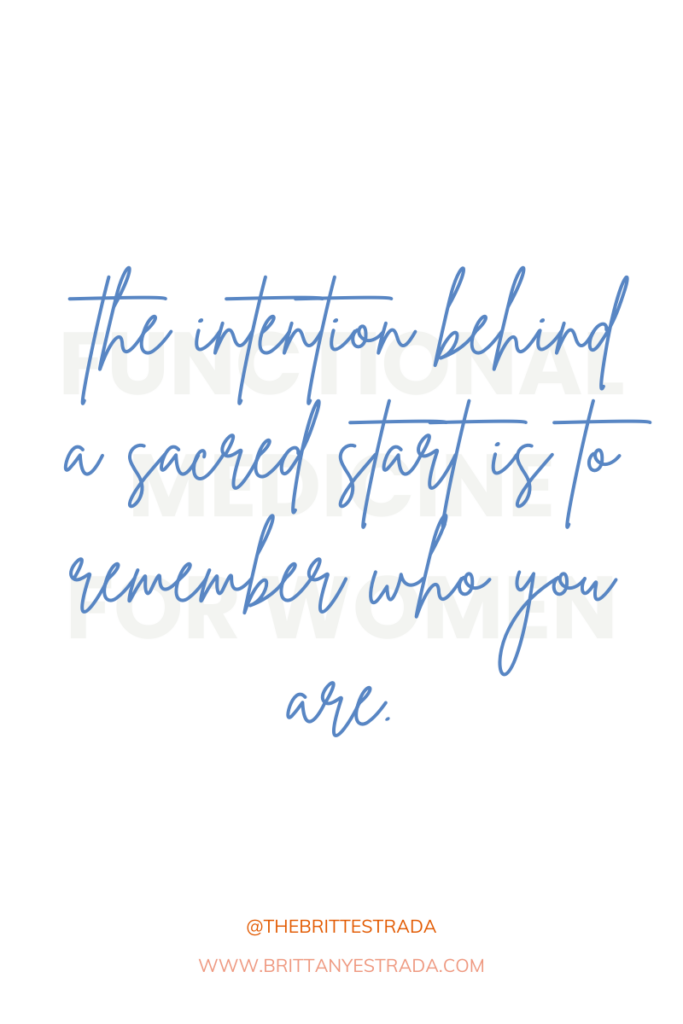
Erica: Yeah. And I find that like the more you talked earlier about the mentality of right versus wrong, if you will. And I think the more that we allow ourselves to come home to us to reconnect with who we really are, the less that we feel the need maybe to explain ourselves to others, the more curious we’re able to stay about other people instead of trying to establish our presence, we just become so much more aligned with ourselves that we trust our presence just as it is instead of this necessity for proving.
Brittany: I just love what you said about how regimented we often think that we need to be. And I’ve heard this from a lot of other women. I’ve heard this from healthcare professionals and spiritual gurus and business gurus. And you’ve gotta do your hour of power every morning in the 30 golden minutes. And especially as I became a mom and just recognized how I was being called into that feminine flow and the flexibility and how much my children have taught me about embracing that peace, like how that practice is the sacred start. It is like no matter what is happening with the kids or with life, I am going to prioritize that connection to myself because that is my direct connection to the divine, the divine is within me. And for most of us, that was not really what was taught. We were taught that it’s this thing outside of yourself that you’ve got to like worship and be obedient to or you’re not going to heaven. You’re gonna go to the bad place. And so just this opportunity to get quiet and go inward and recognize my own divinity and let that be however it needs to look for any given day because I’ve had little kids for seven years now, and I’m still nursing a little one who will be up at random times of the night. And so sometimes the sacred start is five minutes and sometimes it’s an hour, you know, but continuing to stay with the practice, but letting it be this flow, I think is, is the piece that, like you said, women tend to get caught up on and then they never get started because they don’t think they’re going to be able to have this like very regimented practice, which is so, so not needed.
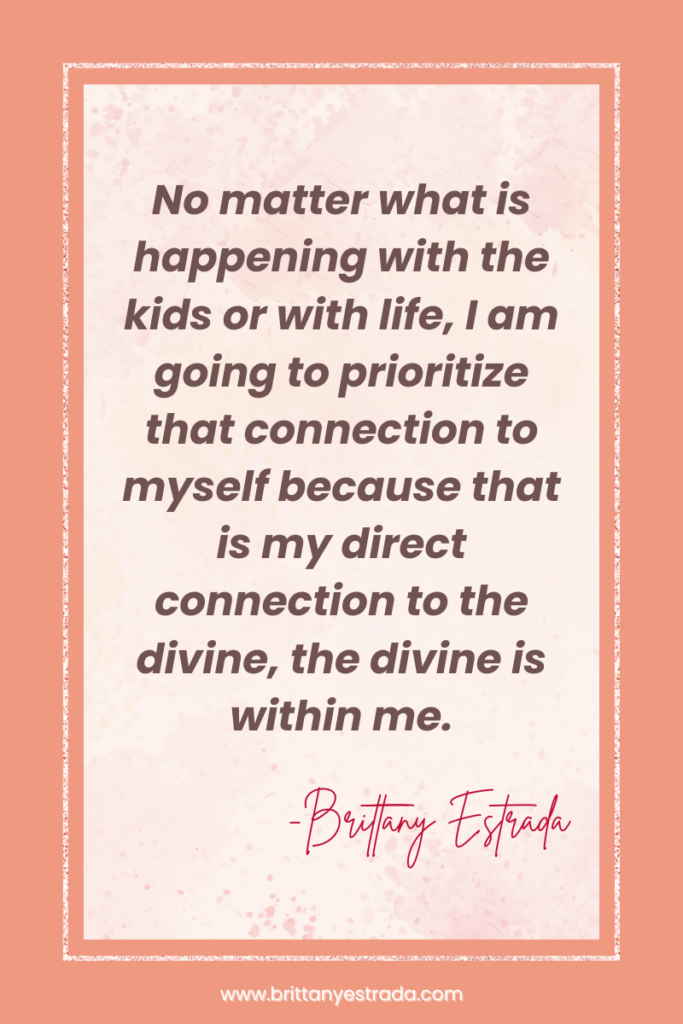
Leah:Yeah, you know, I mean, we also think that it has to feel the same when we do it. Right. And it can be hard to honor the emotional processing or the feelings that arise or, you know, I don’t feel connected and therefore it’s not working. You know, and that’s also not true. You know, we have an opportunity to really explore the dimension of our own selves and our own experience, which, you know, in church, as an example, you know, we couldn’t express anger during a service. Like, that’s not proper. You know, it’s inappropriate, but there is such a thing as sacred rage. And we all must feel her and feel that move through us and recognize it in other women. So when we see it, we can honor it and speak to it. Um, so that the rest of us can reinforce like this is This is why being part of Sacred Women’s Circles has been such an integral practice for me, to be able to be witness to what that looks like so I can learn, you know, that sacred rage is not hysteria. They’re not going to lock me up because I feel very strongly on behalf of…
people in what ways of our world and how as humans decide not to engage in a true spiritual practice.
Pain is inflicted on others and that’s just not okay. So the sacred rage will boil.
Erica: And then we can like honor that and other people as well, right and I think as a mother that is it’s been a challenge for me if I’m being honest because I Was not raised that way. I was not raised that you’re your spectrum of feelings is okay. Like what was okay is good and happy. A differing opinion or upset or sadness needed to either be squashed or fixed and I know that when I’m doing the same thing to my own kids, I’m not in alignment with myself at all. Then they call you on it. It’s a little like beings that teach us so much and when we practice in the way that you’re speaking of and allow ourselves to feel all of it, we can let them and teach them to do the same in a really healthy way.
Leah: Yeah, I mean, it comes back to allowing ourselves to be messy, right? And allowing ourselves to not have the right answers and not get it right sometimes and having to repair with our kids because we might’ve really put more onto them than they needed in that moment. They needed us to show up in a different way, but we learn, right, from that? I think that’s a, talking about involving our kids in sacred practice and learning a new way, for me, has been truly challenging. The piece that I really hold on to is faith. And just the faith that I and my husband were just doing our best. The recognition that my parents were just doing their best and the forgiveness of my neighbors just doing their best. My sister is just doing her best. If we could hold a positive regard that everyone is just trying and also be open and be open to receiving new ideas and trying and experimenting and being messy and saying like I I don’t know. We’ve been raised by generations who were very clear that this is the way forward and this was what we needed to do. And also they were wrong. You know, they had a lot of confidence and in reflection, hindsight is 2020. Yeah. But that’s not to blame, right? That’s just a fact of life. You know, reading medical textbooks from the 1800s, it’s like there were things that they just didn’t know then. And so they were going with the information that they had. And the same is true for us.
Brittany:I think that is a beautiful stopping point. I am super excited to continue this conversation, Leah, over on Patreon. So thank you to everyone who has tuned in. And for more, join us there.

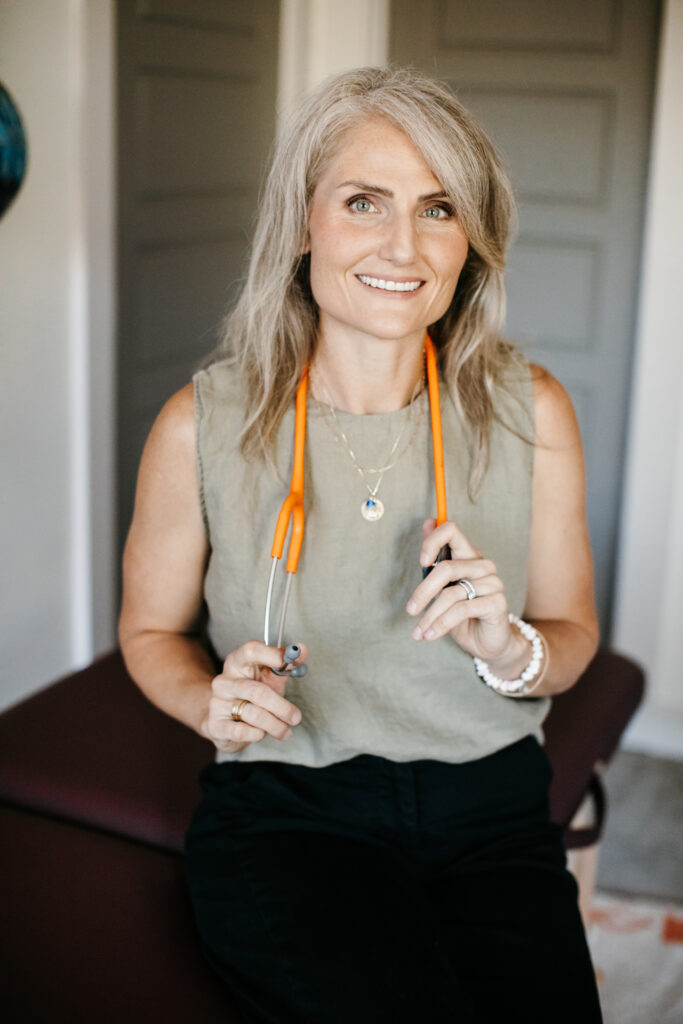
Want more inspiration straight to your inbox?
Check out my free Cyclical Living Guide designed to help you connect to yourself and empower you on your health journey.
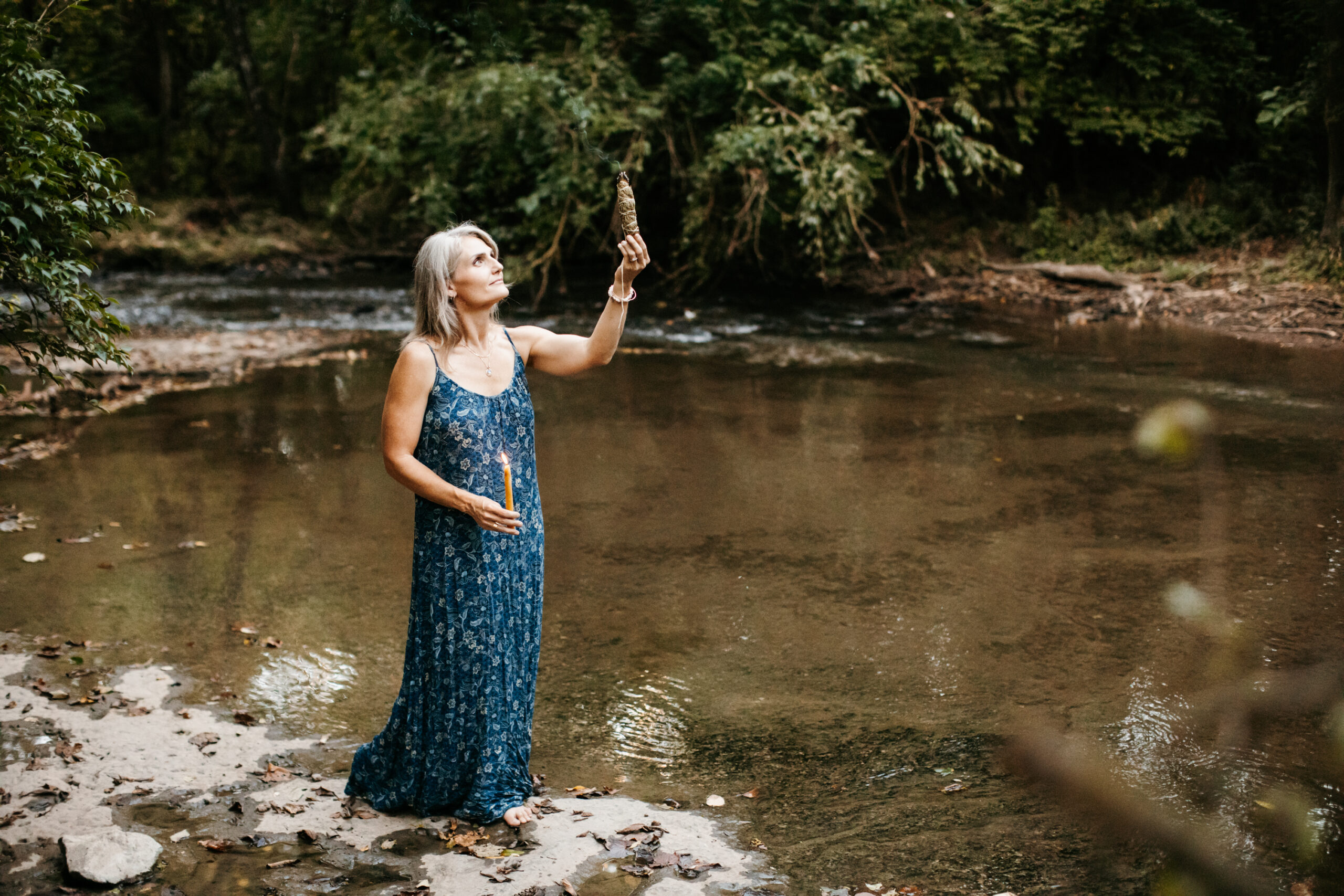
Hi, this is a comment.
To get started with moderating, editing, and deleting comments, please visit the Comments screen in the dashboard.
Commenter avatars come from Gravatar.
Great article! I really appreciate the clear and detailed insights you’ve provided on this topic. It’s always refreshing to read content that breaks things down so well, making it easy for readers to grasp even complex ideas. I also found the practical tips you’ve shared to be very helpful. Looking forward to more informative posts like this! Keep up the good work! YouTube Downloader Online